They studied, passed the exam but were denied nursing licenses. Is Florida at fault?
Romelia Farinas moved to Miami from the Dominican Republic 10 years ago hoping to expand the healthcare career that she’d been preparing for since childhood.
After working for several years as a certified nursing assistant and a patient-care technician, she was encouraged by her employer to take the national exam to become a registered nurse, a natural career step. To prepare, she enrolled in Universal Career School, a private for-profit outfit. While preparing for motherhood — she was six months pregnant — she took the exam and passed.
Her co-workers threw her a party. The celebration was short-lived.
Despite passing the national nursing exam, called the NCLEX, she would not be getting her license due to a bureaucratic standoff between two states — Florida, where she went to school, and New York, whose online portal administered the test.
Florida’s Department of Health would not discuss the matter with the Miami Herald.
The school in Sweetwater is no help. It’s closed, its offices abandoned, its website defunct. She owes $20,000 in student loans.
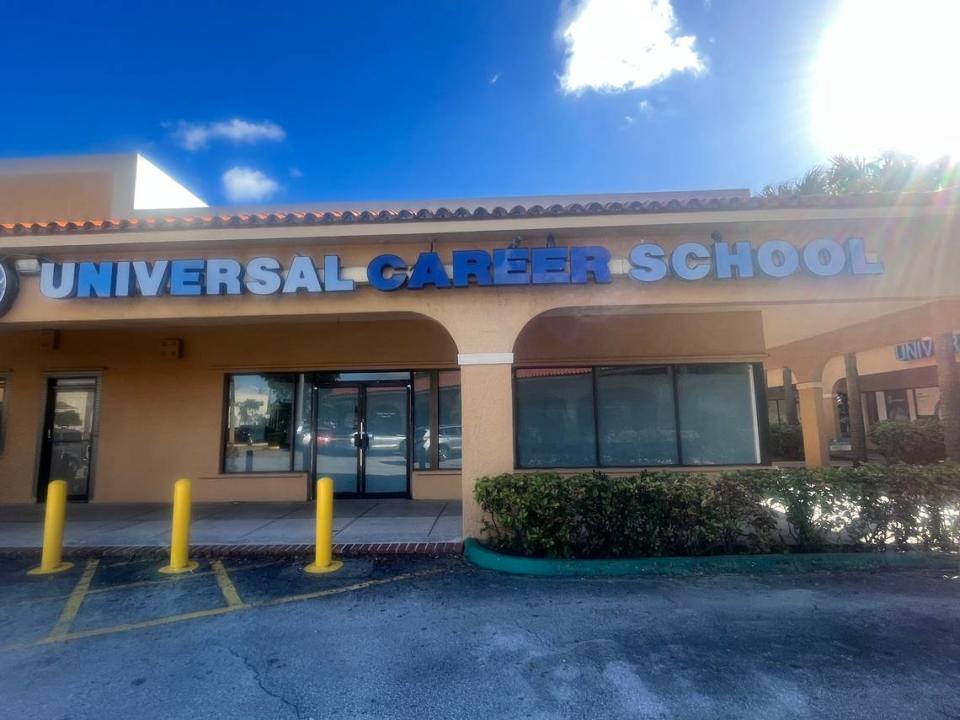
Farinas is the latest example of how students can get burned attending private, for-profit schools, which, in some cases, can have shaky accreditations and disappear overnight. The Herald spoke to eight women who are struggling with similar problems, leaving them in limbo, owing thousands.
It’s happening at a time when nurses are in short supply. According to Nurses.org, a clearing house for those in the profession, Florida is in the top five states projected to have the largest shortage of nurses.
Among the women is Yaimi Perez, 40, who graduated from Miami Regional University in May 2022. Although she lives in Miami, she, too, took the test through the New York online portal, passing in 2023. New York is a popular option, especially among test takers for whom English is not their first language. The test is hard enough for native speakers but can be even harder for those who sometimes struggle with English.
New York offers test takers unlimited opportunities to pass. Florida offers just three. The state that administers the test issues the license. Either way, at the end of the process, the nurses should be able to practice their profession in Florida
On probation
When Perez inquired with the New York State Education Department about her licensing status, it sent an email that she was on hold because her school’s licensure status was “probationary” as indicated on the Florida Department of Health’s list of nursing programs.
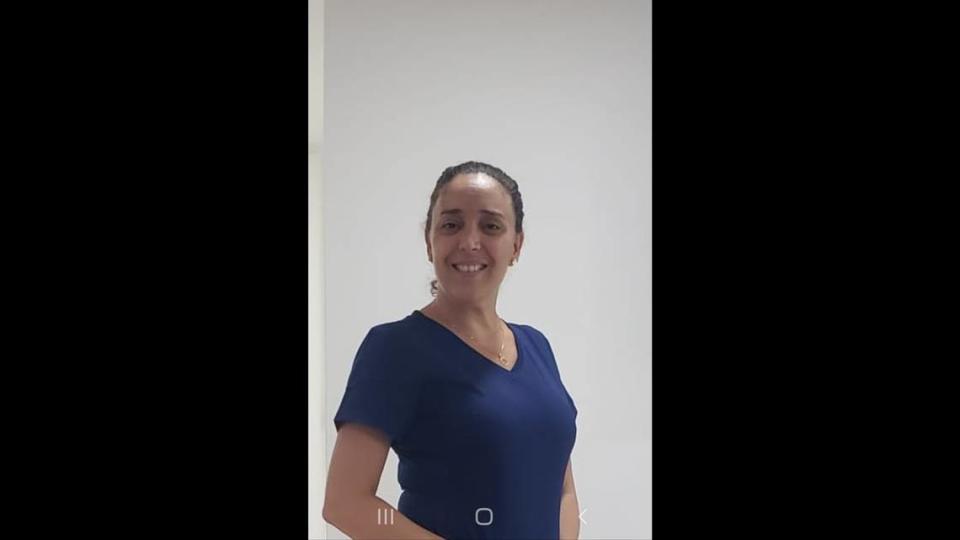
It didn’t matter that the U.S. Department of Education’s Database of Accredited Postsecondary Institutions and Programs said the school was fully accredited. The “probationary” status in Florida meant New York would not issue her the license.
Unlike Universal Career School, Miami Regional University is still in business.
In a statement , Miami Regional University pointed out that its nursing programs are accredited by the Accreditation Commission for Education in Nursing. The university highlighted the COVID-19 pandemic’s negative impact on its associate nursing program test scores but stressed that its most recent passage rates have shown significant improvement.
“We are aware of New York state’s blanket policy banning licensure of out-of-state students as a result of investigations into other schools in Florida and we have advised all graduating students about the current situation in New York.”
A native of Cuba, Perez moved to Miami eight years ago. She is currently unemployed as she tries to determine the best route around her current predicament.
Shuttered school
Universal Career School, closed shortly after Farinas graduated in the spring of 2022.
Now 40, she became interested in medicine at a young age — attending a specialized high school for nursing in her rural hometown before moving to Santo Domingo to attend university.
While studying medicine, she met her future husband, Edgar, who was visiting from Miami. The two married and moved stateside.
Farinas began working as a certified nursing assistant at the Palace at Coral Gables, a high-end independent and assisted living community. She thrived in her new role, earning accolades like “employee of the month” before she was promoted to supervisor of the certified nursing assistants. She later transferred to HCA Kendall, where she currently works as a patient care technician.
She decided to take her career to the next level by taking the NCLEX so she could work as a registered nurse — a role requiring the ability to perform more advanced nursing tasks, including administering medications and managing patient care plans. Her employer, eager to promote her, offered a flexible work schedule so she could attend school.
After graduating, she sat for the nursing exam through the New York portal at a testing site in Doral in March 2023. She passed, but became concerned when after a month she still hadn’t received her license.
Farinas reached out to the New York State Education Department. A customer service representative told her the department was investigating her alma mater and that her license was on hold.
This information stunned Farinas because she’d submitted her transcripts to the department in advance — a prerequisite for sitting for the exam.
“Why didn’t they give me that information ahead of time so I could decide if I take the test or not with the state?” she asked. “It’s so unfair and frustrating.”
A letter to Farinas from the New York State Education Department said the Florida Department of Health and Florida State Board of Nursing had terminated her school’s nursing program in June 2021. It noted that Farinas’ transcript indicated that she completed coursework at the supposedly terminated program in the fall of 2021 — and that she graduated on Feb. 28, 2022.
“Since your education has not been approved, you should not have been eligible for the NCLEX examination,” the letter read.
Eligible or not, she passed on her second try.
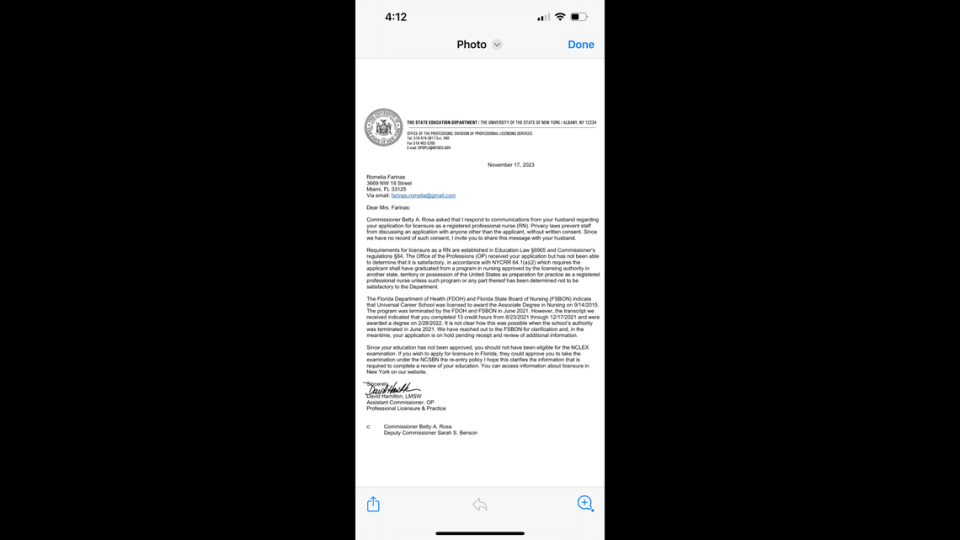
Farinas told the Herald that during the last few months of her enrollment, the administration told her that the school was going to close but she was never informed of any prior termination of the nursing program. The other women who spoke to the Herald said they were similarly blindsided.
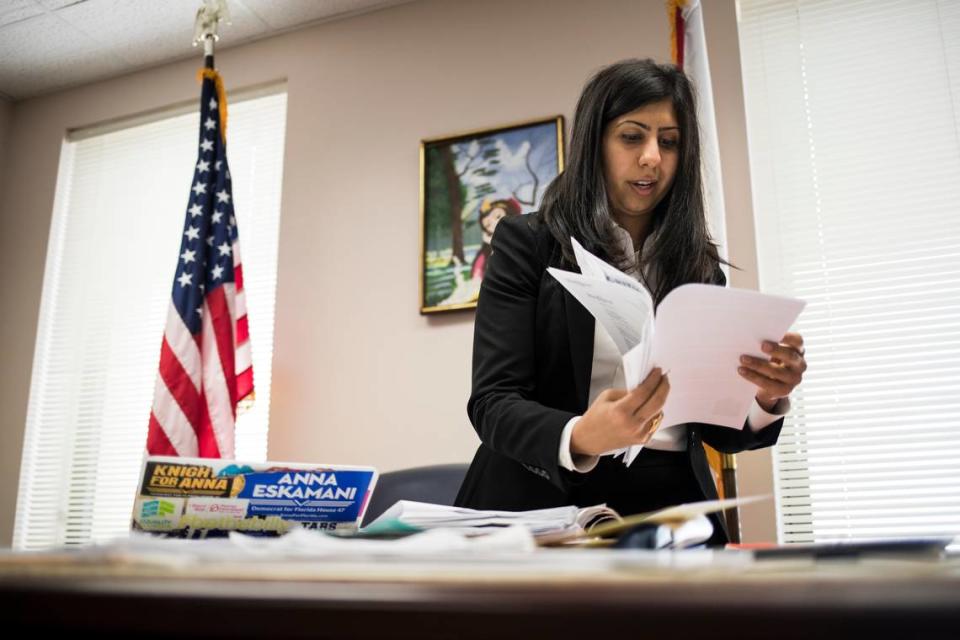
While Florida enforces a three-tries-and-you’re out, policy, an applicant can earn another chance at the test by successfully completing a Florida Board of Nursing approved remedial course.
Florida’s responsibility
State Rep. Anna Eskamani, an Orlando Democrat, believes that the onus is on Florida government officials to offer these women a path forward.
Students who have completed their coursework and passed the required examination, she said, should not be punished due to a lack of accountability and oversight within the state’s for-profit college system.
The Florida Department of Health’s failure either to notify students of their colleges’ changing accreditation status or provide them with a transitional plan exacerbates these issues, according to Eskamani.
“At the very least, there also has to be accountability to get their money back from these institutions that have lied to them,” she aid.
Both Farinas and Perez are now paying off the debts they acquired to fund their education. Farinas, who said she and her husband are five months behind in their mortgage, took out approximately $20,000 in loans. Perez’s debt load is higher — about $36,000.
Eskamani said it is not uncommon for state agencies to create an emergency process in situations like these, or when there is a workforce shortage, as there is in the nursing field.
Be wary
The world of nursing schools is in some cases fraught with fraud. Recently, three South Florida men were tried for allegedly running a nursing-school “diploma mill.” According to prosecutors, over 3,500 students paid between $10,000 and $20,000 for fake academic credentials from the now-defunct Palm Beach School of Nursing. The three were found guilty in December.
Until a pathway forward is found, Farinas feels stuck. Because she says she didn’t have access to her passing score, she’s considered retaking the exam in Florida, but that option is costly, both in time and effort. Aside from the $200 exam fee, it would take months to prepare because the test is so challenging.
“Why do I have to pay for something that’s not my fault?” she said.
After going back and forth with the New York State Education Department for nearly a year, Farinas received a letter two week ago from the department reiterating its decision to withhold her license due to questions surrounding her education.
Except: It said it is willing to release her passing score to Florida so she can complete a separate application process for Florida to issue her a license.
While grateful for this potential reprieve, Farinas maintains that the inability so far to get her license has caused irreparable financial harm.
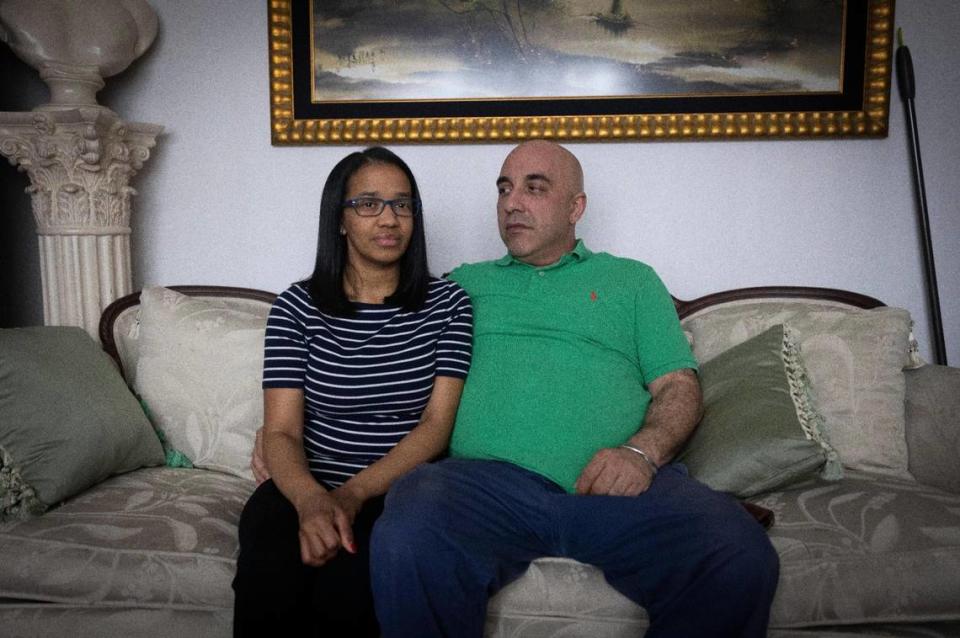
The delay “totally changed our economic situation,” said her husband, Edgar.

